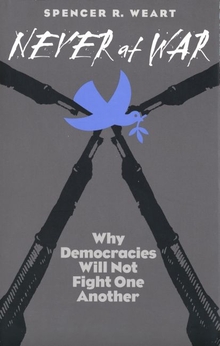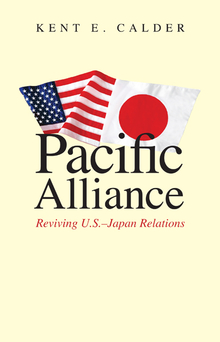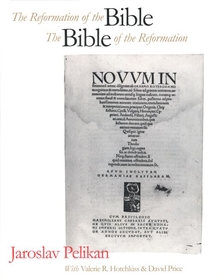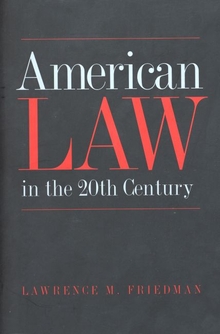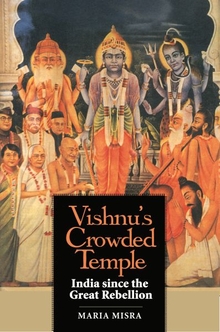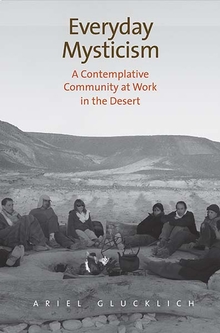Never at War
WARNING
You are viewing an older version of the Yalebooks website. Please visit out new website with more updated information and a better user experience: https://www.yalebooks.com
Why Democracies Will Not Fight One Another
Spencer R. Weart
Weart establishes a consistent set of definitions of democracy and other key terms, then draws on an array of international sources to demonstrate the absence of war among states of a particular democratic type. His survey also reveals the new and unexpected finding of a still broader zone of peace among oligarchic republics, even though there are more of such minority-controlled governments than democracies in history. In addition, Weart discovers that peaceful leagues and confederations—the converse of war—endure only when member states are democracies or oligarchies. With the help of related findings in political science, anthropology, and social psychology, the author explores how the political culture of democratic leaders prevents them from warring against others who are recognized as fellow democrats and how certain beliefs and behaviors lead to peace or war. Weart identifies danger points for democracies, and he offers crucial, practical information to help safeguard peace in the future.
“This is a book that will be widely read. Weart considers in detail and complexity a topic of major interest—the mechanisms by which peace is achieved or missed.”—Bruce Russett, Yale University
“Weart’s is the most comprehensive overview of the Democratic Peace phenomenon yet written. . . . Weart throws considerable weight behind those who seek international peace through democratization. Never at War is a rare commodity, academically timely but crisply written, accessible to interested readers of all levels.”—Choice
"This hybrid of history and political science makes the daring though commonsense argument that democratic forms of government, when animated by a culture that has learned how to accommodate fierce internal disagreements and defuse boiling tensions, will produce leaders who solve problems abroad using the same nonviolent strategies that keep the peace at home."—First Things
“Weart lays out his case in clear, readable prose and livens his narrative with entertaining anecdotes. . . . Never at War is in many ways the most accessible and comprehensive brief for the democratic peace available. . . . Never at War is a useful contribution to this important debate.”—Stephen Walt, Foreign Affairs
“Weart constructs a persuasive theory to explain why democracies do not go to war with one another and presents evidence that further confirms the pattern of democratic peace. . . . Never at War represents a fine contribution to the theory of the interdemocratic peace and is essential reading for any historian or international relations scholar interested in understanding how regime type affects foreign policy.”—William F. Mabe, Jr., Journal of Interdisciplinary History
“Weart bases his thesis on an enormous amount of research in historical, sociological, anthropological, and political science sources. He mixes the methodologies of all these disciplines to arrive at his well-argued conclusions. A remarkable piece of scholarship.”—Library Journal
"A remarkable piece of scholarship; for all large collections and for those specializing in war and peace studies."—Library Journal
“Are democratic nations really less likely to resort to war than autocracies or dictatorships--be they hereditary, communist, fascist or fundamentalist? Spencer R. Weart’s book Never at War contains one of the most definitive discussions of this issue.”—Michael Pearlman, Military Review
“A stimulating, impressive and important contribution. It has three particular virtues. First it is clearly written, and is thus fully accessible to an audience beyond the academy. Second, the scope of the inquiry is wide. . . Third, [Weart] offers a refined version of the democratic peace hypothesis.”—Michael Mandelbaum, New York Times Book Review
“[A] capacious work. Its importance goes beyond the democratic peace: it suggests both that culture matters in international relations and that republican culture is not as temporally and spatially bounded as many think.”—John M. Owen, Political Science Quarterly
"The theory of the 'Democratic Peace' is transforming international relations theory and practice. Never at War, by Spencer R. Weart, is one of the basic research studies underlying this important new theory. It is the only such study to review the findings throughout human history. As such, it is one of the most important books of our age."—Ambassador John Norton Moore, Former Chairman of the Board of the United States Institute of Peace
Publication Date: April 10, 2000

